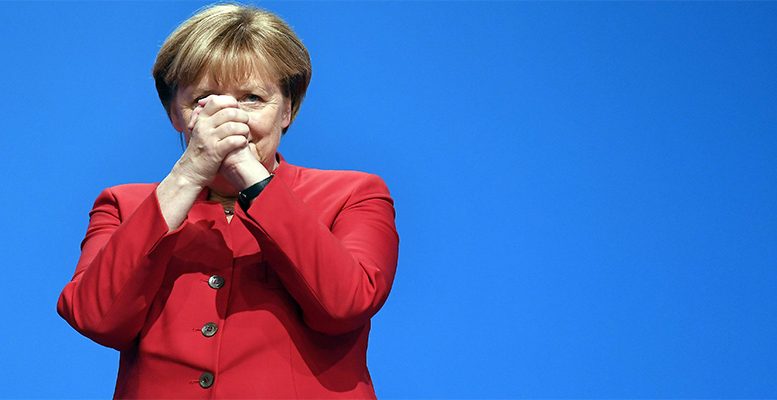At the beginning of 2017, the European Union was facing a quite turbulent looking year with various elections in key EU countries and major policy decisions on the horizon. There were other issues for Brussels to deal with as well, such as the protracted immigration crisis or an inscrutable Donald Trump.
The spring was full of the words “Nexit” and “Frexit” in the media, referring to the hypothetical withdrawal of the Netherlands and France from the European Union, before the elections in these countries. Euro-sceptic party leaders such as Geert Wilders (Party for Freedom) or Marine Le Pen (National Front) had drawn massive media attention and were seen as genuine challengers of their Europhile peers, Mark Rutte and Emmanuel Macron, respectively. But in the end, the latter two won fairly comfortably. Two nervous elections, but two wins that were massive from the EU’s point of view.
In June, the general election in the UK, called by Prime Minister Theresa May, seemingly only served to further complicate the already difficult Brexit negotiations, showing just how burdensome Britain’s way out of the EU is going to be. At the moment, the stalled negotiations over the so-called “divorce bill” and other issues point to stressful further talks between the EU and UK in the coming months.
It is September now, and the Catalan independence vote is dominating the front-pages across Europe. So in the midst of this political roller-coaster over the past months, it appears already that no-one is giving much importance to the upcoming federal elections in Germany.
Polls are showing that the governing Christian Democratic Union (CDU) and Christian Social Union (CSU) coalition, led by current chancellor, Angela Merkel, will once again win. There are various issues and questions, however, that make this election especially important for Germany and the European Union.
One of the main talking points is the refugee crisis and how it is handled by Chancellor Merkel and her government. Germany has been the prime destination for refugees and the country welcomed over 700,000 of them in 2016 and almost 150,000 this year, according to government statistics. This “open arms” policy has been strongly criticised by far-right newcomer, Alternative for Germany (AfD). The party, founded in 2013 and led by Alice Weidel and Alexander Gauland, has gained nationwide support and it is increasingly likely it will be the first far-right party, since the Nazis in 1945, to send delegates to the Bundestag. That said, AfD is not exempt from controversies. Let’s take, for example, its leader Alice Weidel who looks a somewhat strange choice to be the number one of a right-wing, populist party:
“Weidel seems an unlikely leader for a party that decries gay marriage and gender mainstreaming, “American finance capital”, immigration and “globalism”. Weidel used to work for Goldman Sachs and Allianz Global Investors, is openly lesbian and lives in Switzerland – for tax reasons – with a partner originally from Sri Lanka. The couple have adopted two children. They have recently been accused of illegally employing a Syrian refugee as a cleaner”, wrote Alan Posener in The Guardian.
Nonetheless, it will certainly be interesting to see whether, if elected, Merkel changes her refugee policy and how she will deal with the AfD in parliament.
Another issue is that even though the CDU-CSU coalition is way ahead of SDP in recent polls, around 36% and 22% respectively, they are unlikely to win an absolute majority in parliament. So they must find a coalition partner. An obvious option would be to maintain the current “Grand Coalition” with Martin Schulz’s Social Democratic Party (SDP). The other option would be to turn to the liberal Free Democratic Party (FDP) and the Green Party and form a so-called “Jamaica” coalition with them.
“I think if the SDP gets historically low results of 22% or lower, the chances probably rise that it will go into opposition. I think regardless what happens we will probably see an attempt to form a “Jamaica” coalition first. If that fails then they will perhaps default to “Grand Coalition” talks”, said Noah Barkin, Reuters’ Europe Correspondent in a podcast on Thursday.
Perhaps a less pressing, but still relevant question on German foreign policy is how the new government can find common ground with the increasingly louder Visegrad Group (V4). The alliance of Hungary, Czech Republic, Poland and Slovakia is seemingly unshakable in its opposition to the EU’s migrant quota system and the kind of “open arms” policy towards refugees that Germany has been showing. However, Germany is a top economic and commercial ally of the V4 countries. German companies, principally carmakers, have several factories across Visegrad Group countries. The country is also one of the top destinations for Hungarian, Polish, Czech and Slovakian citizens looking for work abroad. From a geopolitical and economic perspective, it will be absolutely vital for the new German government to find solutions for the problems with V4 nations.
It looks like the stage is set for yet another CDU-CSU win on Sunday, but the more important questions will come afterwards. What will the new coalition look like? Who will be the big loser in the election? How will the final outcome affect the immigration policy? What will the implications of the election be on geopolitical issues and the energy sector?





